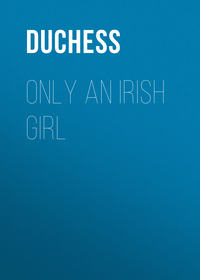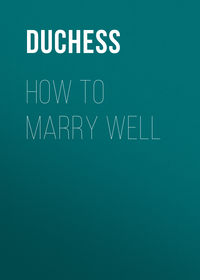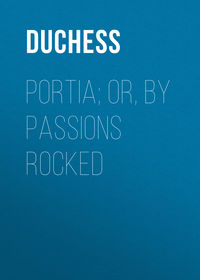 полная версия
полная версияRossmoyne
"Ay, and a fine temper under it, or I'm a Dutchman," says Miss Priscilla. "And she is more peculiar than handsome; but men admire her, so we say nothing."
"Is she tall?" asks Monica, anxiously, who is a little thing herself, and looks even smaller than she really is because of her slender, girlish figure. She wonders in a vague, uncomfortable fashion whether – whether most men like tall women best.
"Tall? yes, and large in proportion; and as for her manners," says Miss Priscilla, in her severest tone, "in my opinion they are simply unbearable. Modesty in my days was a virtue, nowadays it is as naught. Bella Fitzgerald is never content unless she has every man in the room at her side, and goodness alone knows what it is she says to them. The way she sets her cap at that poor boy Ronayne, just because he has fallen in for that property, is quite revolting."
"And a mere lad, too," says Miss Penelope.
Monica draws a breath of relief. Perhaps if Miss Fitzgerald likes Mr. Ronayne she will not care to practise her fascinations upon – any other man.
"How old is she?" she asks, feeling deeply interested in the conversation.
"She says she is twenty-four," says Miss Priscilla, with an eloquent sniff. "There is nothing easier to say than that. I won't be uncharitable, my dear Penelope, – you needn't look at me like that, – but this I must say, she looks every hour of eight and twenty."
"Her mother ought to know," says Miss Penelope.
"She ought, indeed," grimly. "But, as from the way she dresses we may reasonably conclude she thinks herself nineteen, I suppose she has lost her memory on all points."
"Her father, Otho Fitzgerald, was the same," says Miss Penelope, reflectively. "He never could bear the idea of age. He was one who saw nothing honorable in it. Gray hairs with him were a crime."
"So he used to dye them," says Miss Priscilla, maliciously; "and when he got warm the dye used to melt, and (unknown to him) run all down his cheek."
"Oh, Priscilla, how you remember things? Dear, dear, I think I see him now," says Miss Penelope. And here the two old ladies, overcome by this comical recollection, laugh until the tears run down their faces. Monica joins in from sheer sympathy; but Kit, who is sitting in the embrasure of a distant window and who had been strangely silent ever since the invitation came from Aghyohillbeg, maintains a stern gravity.
"Poor man," says Miss Penelope, wiping her eyes, "I shall never forget the night your sweet mother, my dear Monica, most unintentionally offended him about the diamond – you recollect, Priscilla? Tell Monica of it."
"He always wore a huge diamond ring upon his little finger," says Miss Priscilla, addressing Monica, "of which he was very proud. He was at this time about fifty-three, but used to pose as a man of thirty-nine. One evening showing the ring to your mother, then quite a girl, he said to her, in his stilted way, 'This jewel has been in our family for fifty years.' 'Ah! did you buy it, Mr. Fitzgerald?' asks your mother, in her sweet innocent way. Ha, ha, ha!" laughs Miss Priscilla, "you should have seen his face. It was a picture! and just when he was trying to make himself agreeable to your poor mother, and acting as if he was a youthful beau of twenty-five, or at least as young as the best of us."
"That was so like mother," says Monica, in a low tone. "She always knew where to touch people."
"Oh, no, my dear, not at all like her," says Miss Penelope, hastily. "She didn't mean it, you must understand; she was the very soul of sweetness, and would not willingly affront any one for the world."
For just an instant Monica lifts her eyes and gazes earnestly at her aunt; but the old face is so earnest and sincere that with a faint sigh she lowers her eyes again, and makes no further remark.
"After that he married his cousin's wife, a widow with one child, this girl, Bella," says Miss Priscilla, still full of reminiscences, as old people will be. "A most unpleasant person I thought her, though she was considered quite a belle in those days."
"She always appeared to me such a silly woman," says Miss Penelope.
"She is worse than that now," says Miss Priscilla, who seems specially hard on the Fitzgeralds. "She is a shocking old woman, with a nose like a flower-pot. I won't say she drinks, my dear Penelope, because I know you would object to it; but I hear she does, and certainly her nose is her betrayer."
"Do you remember," says Miss Penelope, "how anxious she once was to marry George Desmond?" This she says in a very low tone.
"Yes, I remember." The bare mention of her enemy's name has sent a flush of crimson into Miss Priscilla's cheeks. "But he never bestowed a thought upon her."
"Oh, no, never," says Miss Penelope, after which both the Misses Blake grow silent and seem to be slowly sinking into the land of revery.
But Monica, having heard the "enemy's name" mentioned, becomes filled with a determination to sift the mystery connected with him, now, to the end.
"Aunt Priscilla," she says, softly, looking at her with grave eyes across Miss Penelope's knees, "tell me, now, why Mr. Desmond is our enemy."
"Oh, not now," says Miss Penelope, nervously.
"Yes, now, please," says Monica, with ever-increasing gravity.
"It may all be said in a few words, Monica," says Miss Priscilla, slowly. "And what I have to say affects you, my dear, even more than us."
"Me?"
"Yes, in that it affects your mother. Twenty years ago George Desmond was her affianced husband. Twenty years ago, wilfully and without cause, he deliberately broke with her his plighted troth."
"He threw her over?" exclaims Monica, aghast at this revelation.
"Well, I never heard be used actual violence to her, my dear," says Miss Penelope, in a distressed tone; "but he certainly broke off his engagement with her, and behaved as no man of honor could possibly behave."
"And mother must have been quite beautiful at that time, must she not?" says Monica, rising to her knees in her excitement, and staring with widely-opened eyes of purest amazement from one aunt to the other.
"'Beautiful as the blushing morn,'" says Miss Priscilla, quoting from some ancient birthday-book. "But, you see, even her beauty was powerless to save her from insult. From what we could learn, he absolutely refused to fulfil his marriage-contract with her. He was false to the oath he had sworn over our father's dying bed."
Nothing can exceed the scorn and solemnity of Miss Priscilla's manner as she says all this.
"And what did mother do?" asks Monica, curiously.
"What could she do, poor child? I have no doubt it went nigh to breaking her heart."
"Her heart?" says Monica.
"She suffered acutely. That we could see, or rather we had to guess it, as for days she kept her own chamber and would see no one, going out only when it was quite dusk for a solitary ramble. Ah! when sorrow afflicts the soul, there is no balm so great as solitude. Your poor mother took the whole affair dreadfully to heart."
"You mean that she really fretted?" asks Monica, still in the same curious way, with her eyes fixed on her aunt. There is, indeed, so much unstudied surprise in her whole manner as might have produced a corresponding amount in the Misses Blake, had they noticed it.
"Yes, my dear, of course. Dear, dear, dear! what a sad thing it all was! Well, now you understand all that it is needful you should, Monica," says Miss Penelope, with a glance at her sister, who really seems quite overcome. "So we will say no more about it. Only you can see for yourself how impossible it is for any of our blood to be on friendly terms with a Desmond."
"They may not all be like that Mr. Desmond," says Monica, timidly, coloring to her brow.
"Yes, yes. Like father, like son; you know the old adage; and a nephew is as close a relation almost. We can know no one at Coole."
"I would almost rather see you dead than intimate with one of the name," says Miss Priscilla, with sudden harshness.
"I don't think we told Monica about the other guests at Aghyohillbeg," says Miss Penelope, hastily, with the kindly intention of changing the conversation. "A very pretty young woman came there about a week before your arrival, child, and is to remain, I believe, for some time. She is a widow, and young, and – by the bye, I wonder if she can be any relation to your friends in the South of France."
"Why?"
"Her name is Bohun, and – "
"Not Olga Bohun?" says Monica, springing to her feet. "A widow, you say, and young. Oh! auntie, if she only might be Olga!"
"Well, certainly she has a heathenish – I mean, a Russian – name like that," says Miss Priscilla. "She is a very little woman, with merry eyes, and she laughs always, and she has the prettiest, the most courteous manners. Quite a relief I found her, after the inanities of Bella Fitzgerald."
"She is even smaller than I am. Yes, and her eyes do laugh!" says Monica, delight making her cheeks warm. "She is the prettiest thing. Ah! how happy I shall be if I may see her sometimes!"
"You shall see her just as often as ever you and she wish," say the two old maids in a breath, glad in the thought that they can make her home at Moyne happy to her.
"I hope you like her," says Monica, glancing from one to the other of them.
"Yes. I thought her quite fascinating," says Miss Penelope. "Some people say she is rather – rather fast, I believe is the word they use nowadays," getting the word out with difficulty, as though afraid it may go off and do somebody an injury. "But for my part I don't believe a word of it. She is quite natural, and most pleasing in manner, especially to those who are older than herself. A great charm in these times, my dear, when age is despised."
Plainly, the little widow at Aghyohillbeg has been playing off her sweetest graces upon the two Misses Blake.
"I dare say Monica will like young Ronayne," says Miss Priscilla. "He is quite nice, that lad. But I hope, Monica, that, even if circumstances should throw you together, you will take no notice of young Mr. Desmond. I myself would not exchange a word with him if a queen's diadem were offered me as a bribe."
"You might speak to him without knowing him," says Monica, blushing again that nervous crimson of a while ago.
"Impossible, my dear. Instinct, sharpened by hatred, would tell me when one of the race was near me."
"Well, as it is your first party here, dear child, I hope you will enjoy it," says Miss Penelope, quickly, as though again anxious to throw oil on the waters by changing the conversation. "It is a charming place, and its mistress, if a little rough, is at least kindly."
At this moment Kit, emerging from the curtains that have hidden her for the past hour, comes slowly to the front. Her face, her very attitude, is martial. She is plainly in battle-array. Pausing before Miss Priscilla, she directs her first fire upon her.
"Am I not asked at all?" she says, in a terrible tone, that contrasts painfully with the ominous silence she has maintained ever since the invitation was brought by Mrs. O'Connor's groom.
"My dear child, you must remember you are only fourteen," says Miss Priscilla, who is sincerely sorry the child has not been included in the invitation, and, in fact, thinks it rather unkind she has been left out.
"I know that, thank you," says the youngest Miss Beresford, uncompromisingly, fixing her aunt with a stony glare. "I know my birthday as well as most people. And so, just because I am a child, I am to be slighted, am I? I call it unfair! I call it beastly mean, that every one here is to be invited out to enjoy themselves except me."
"Young people are seldom asked to grown-up parties," says Miss Priscilla, in her best conciliatory manner. "When you are as old as Monica, of course you will go everywhere. In the meantime you are only a child."
"I am old enough to conduct myself properly, at all events," says Kit, unmoved. "I suppose at fourteen" – as if this is an age replete with wisdom – "I am not likely to do anything very extraordinary, or make myself unpleasant, or be in anybody's way."
"That is not the question, at all: it is merely one of age," says Miss Priscilla.
"Is it? And yet people say a great deal about childhood being the happiest time of one's life," says Kit, almost choking with scornful rage. "I should just like to see the fellow who first said that. Maybe I wouldn't enlighten him, and tell him what a hypocrite he was. Whoever said it, it is a decided untruth, and I know I wish to goodness I was grown up, because then," with withering emphasis, "I should not be trampled upon and insulted!"
This is dreadful. The two old ladies, unaccustomed in their quiet lives to tornadoes and volcanoes of any kind, are almost speechless with fright.
"Dearest," says Monica, going up to her, "how can you look at it in such a light?"
"It's all very well for you," says the indignant Kit: "you're going, you know. I'm to stay at home, like that wretched Cinderella!"
"Katherine, I am sure you are quite unaware of the injustice of your remarks," says Miss Priscilla, at last finding her voice. She is bent on delivering a calm rebuke; but inwardly (as any one can see) she is quaking. "And I have frequently told you before that the expression 'I wish to goodness,' which you used just now, is anything but ladylike. It is not nice; it is not proper."
"I don't care what is proper or improper, when I am treated as I now am," says the rebel, with flashing eyes and undaunted front.
"There is really nothing to complain of," says Miss Priscilla, earnestly, seeing censure has no effect. "Madam O'Connor would not willingly offend any one; she is a very kind woman, and – "
"She is a regular old wretch!" says the youngest Miss Beresford, with considerable spirit.
"My dear Katherine!"
"And it's my belief she has done it on purpose!" with increasing rage.
"Katherine, I must insist – "
"You may insist as you like, but I'll be even with her yet," persists Kit, after which, being quite overcome with wrath, she breaks down, and bursts into a violent fit of weeping.
"My dear child, don't do that," says Miss Penelope, rising precipitately, and going over to the weeping fury. "Priscilla," in a trembling tone, "I fear it is selfish. I think, my dear, I shall stay at home, too, the day you all go to Madam O'Connor's."
This kills the storm at once.
"No, no, indeed, Aunt Penny, you shan't." Kit cries, subdued, but still in tears. She is overcome with remorse, and blames herself cruelly in that her ill temper should have led to this proposal of self-sacrifice. To give in to Kit is the surest and quickest method of gaining your own point. She throws her arms, as she speaks, around Miss Penelope's neck, and nearly strangles that dear old lady in her remorseful agitation, to say nothing of the deadly havoc she makes of her frills and laces.
"But indeed, my Kitten, it will be no privation to me to stay at home with you, and we will be quite happy together, and we will have our tea out in the orchard," says Miss Penelope, soothing her with sweet words; while Miss Priscilla, who is thoroughly frightened by the sobbing, pats the refractory child on the back, with a view to allaying all fear of convulsions.
"You shan't stay at home, Aunt Penny, – you shan't indeed," cries the inconsistent Kitten. "I like being alone, I love it; if you don't go to that place with the long name, and enjoy yourself very much, I shall be miserable all my life, though I love you very, very, very much for wishing to keep me from being lonely. Tell her I mean it, Monica."
"Yes, I am sure she means it," says Monica, earnestly, whereupon peace is once more restored to the breasts of the terrified aunts.
CHAPTER VI
How Monica goes to Aghyohillbeg, and meets there an old friend and a very new one.
Time flies, and no man can reach his hand to stay it. A very good thing, too, thinks Monica, as she stands before her looking-glass putting the last pretty touches to her white toilet.
It is Friday. Madam O'Connor's garden-party lies before her, and, probably, other things. Here she blushes at herself, as she sees that pretty soul in the glass, though, indeed, she has no cause to do so; but possibly the vague thought of those "other things" has something to do with it, and perhaps it is for their sake too that she places with such care the heavy, blood-colored rose beneath her chin.
This is the only suspicion of color about her. Her gown is white; her hat is white; long white silk gloves run up her rounded arms as though bent on joining her sleeves far above the elbow. A white Surat sash is tied round her dainty waist. She is looking "as fair as the moon, as lovely as a rose," and altogether distinctly dangerous.
Perhaps she half recognizes this fact, because she smiles at her own reflection, and – vain little girl that she is – stoops forward and kisses herself in the happy glass that holds her even for so brief a minute; after which she summons her maid from her dressing-room beyond.
"Canty," she says, as the "uncle's wife's sister's child" enters, "I am dressed now; and – "
"Shure, so you are, miss; and lovely ye look, more power to ye."
"Make my room very tidy," says Monica, giving her her directions before starting. "And, Canty, I shall want my blue dress for dinner. You can put it out."
"Yes, miss," whereupon Monica prepares to leave the room; but the new maid stops her.
"If ye please, Miss Monica," she says, hesitating, and applying her apron to her lips.
"Yes, Canty?"
"I'd be very thankful to ye, miss, if ye wouldn't call me that."
"Call you what?"
"Canty, miss."
"But," astonished, "isn't it your name?"
"No, miss; me name is Bridget."
"But surely Canty is your name, too?"
"Well, it's me father's name, miss, no doubt; but faix I feel just like a boy when ye call me by it, an' ye wouldn't like me to feel like a boy, miss, would ye?" says the village beauty casting an anxious glance at Monica from her dark Irish eyes, and blushing deeply.
"Certainly not," says Monica, laughing a little. "Very well, Bridget; I shall try to forget you ever had a surname."
"Thank ye, miss," says Bridget, with a sigh of profound relief.
Then Monica runs downstairs, where she finds her aunts in the drawing-room, dressed in their very best silk gowns, waiting for the carriage to come round. There is a little delay, which wasted time the two old ladies spend in endeavoring to drill Terence into shape. Something of this sort is going on as Monica enters.
"When I introduce you to Madam O'Connor or Lady Rossmoyne, my dear boy, be sure you make a very low bow. Nothing distinguishes a gentleman so much from the common herd as the manner of his salute. Now make me a bow, that I may judge of your style." Thus Miss Priscilla.
"I couldn't make one to order like that," says Terence; yet he sulkily complies, making a very short, stiff, and uncompromising nod that makes both aunts lift their hands in dismay.
"Oh, no, my dear! – that won't do at all! Most ungraceful, and totally devoid of the dignity that should inspire it. Now look at me. It should be something like this," making him a reverence that might well have created admiration in the court of Queen Anne.
"Ah, yes! that is something like what it should be," chimes in Miss Penelope, paying a tribute to the talent of her sister. "Priscilla has caught the true tone. I wish, Terence, we could see you more like your dear grandfather; he was a man to bow."
Terence, calling to mind the portrait of his "dear grandfather," as represented in the elaborate gilt frame in the dining-room, in a court suit and a periwig, and with an abominable simper, most devoutly thanks his gods that he is not like unto him. He is, indeed (feeling goaded to the last degree), about to break into unseemly language, when, fortunately, the arrival of the ancient equipage that has done duty at Moyne as state carriage for generations is announced.
The coachman, who is considerably older than Timothy, draws up the old horses before the door with a careful manner that impresses the beholder with the belief that he thinks they would run away in a minute if he relaxed a muscle on the reins; and a small boy who acts as footman and looks decidedly depressed, lets down the rickety steps.
Miss Priscilla Blake then enters the carriage. She is followed with much ceremony by Miss Penelope. After which Monica, who is impressed by the proceedings, and Terence, who is consumed with secret mirth, step in and seat themselves. Then the coachman says, "Gee up!" in exactly the tone he has employed for forty years; and the gloomy boy settling down beside him, they are all presently on the fair road to Aghyohillbeg.
The drive is a very pleasant one, though filled with injunctions of the most obsolete from the Misses Blake as to their behavior, etc. The fact is, that the two old maids are so puffed out with pride at the thought that they will presently introduce to the county the handsome lad and beautiful girl opposite them that they have grown fidgety and over-anxious about the niceties of their presentation.
"Surely," say the Misses Blake to themselves and to each other, "not half so pretty a pair could be produced by any family in the south!"
Which is saying a great deal, as in the south of Ireland a pretty face is more the rule than the exception.
Over the dusty road they go, calmly, carefully, the old horses being unaccustomed to fast ways of any sort; slowly, with much care they pick their aged steps, never stumbling, never swerving, but as certainly never giving way to frivolous haste.
Then, all at once, as it seems to Monica, the hillside seems to break in twain, and a great iron gate appears, into which they turn to drive in their solemn fashion down a dark avenue shaded by swaying elms.
It is a perfect place, old as the hills that surround it, and wild in its loveliness. To right and left great trees, gnarled and moss-grown, and dipping tangles of blackberry and fern; patches of sunlight, amidst the gloom, that rests lovingly upon a glowing wilderness of late bluebells, and, beyond all these broad glimpses of the glorious, restless ocean, as it sleeps in its bay below.
Gazing at all this natural beauty, Monica's soft eyes and heart expand, and, —
"Joy rises in her like a summer morn."And then she sees an old house, low, broad, picturesque, with balconies and terraces, and beyond the house slanting lawns, and at one side tennis-courts, where many gayly-clad figures are moving to and fro. There is a sound of subdued laughter and the perfume of many flowers, and a general air of gayety; it is as though to-day care has utterly forgotten this one favored corner of the earth.
Then they all descend from the time honored chariot, and cross the lawn to where they can see their hostess standing, tall and erect and handsome, in spite of her sixty years.
"Your niece?" says Madam O'Connor, staring hard at Monica's pure little face, the girl looking straight back at her with a certain amount of curiosity in her eyes. – "Well, I wish you no greater fortune than your face, my dear," says the old Irishwoman. "It ought to be a rich one, I'm thinking. You're like your mother, too; but your eyes are honester than hers. You must know I knew Kitty Blake very well at one time."
"I have heard my mother speak of you," says Monica.
"Ay – so? Yet I fear there wasn't much love lost between us."
Then she turns a little aside to greet some one else, and Monica lets her eyes roam round the grounds. Suddenly she starts, and says out loud, —
"Ah! there is Olga?"
"You know Mrs. Bohun, then?" says her hostess, attracted by her exclamation and her pretty vivacious expression.
"So very, very well," says Monica. She has flushed warmly, and her eyes are brilliant. "I want to speak to her; I want to go to her, please."
"Bless me! what a shame to waste that lovely blush on a mere woman!" says Madam O'Connor, with a merry laugh. "Here, Fred," turning to a young man standing close to her with a very discontented expression, "I am going to give you a mission after your own heart. You are to take Miss Beresford over there, to where Mrs. Bohun is dealing death to all those boys. – This is Lord Rossmoyne, Miss Beresford: he will see you safely over your rubicon."









